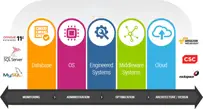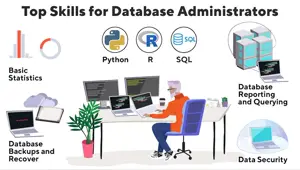Database Administrator Jobs
1. What is a Database Administrator (DBA)?
A database administrator (DBA) is a specialized computer systems administrator who maintains a successful database environment by directing or performing all activities related to keeping data secure. The ultimate responsibility of a DBA expert is maintaining data integrity. This means the Database Administrator will ensure data is secured from unauthorized access but available to users.
A Data Administrator will typically have knowledge and experience working with many database management products such as Oracle-based software, SAP, and SQL, in addition to having a Computer Science degree and hands-on experience and relevant IT certifications, if any.
2. Main duties and responsibilities of a Database Administrator
Working as a DBA requires individuals to work well in a team environment, communicate effectively with key stakeholders, and operate efficiently with minimal oversight. Many job postings featured online highlight the following key skills, responsibilities, and job requirements when applying for a Database Administrator position:
-
Install, upgrade, and patch databases
-
Install and configure related networking components
-
Ensure database access, consistency, and integrity
-
Address issues related to performance bottlenecks
-
Provide reports on various metrics including availability, usage, and performance
-
Perform performance and operational checks
-
Work with development staff on architecture, coding standards, and quality assurance policies
-
Create models to develop new or modify existing database models
-
Respond to and resolve issues regarding performance and database access
-
Monitor database system details
-
Design and implement systems, policies, and disaster recovery processes
-
Monitor, optimize, and allocate physical storage for database systems
-
Plan and coordinate data migration
-
Develop, implement, and maintain change control and change management procedures
-
Perform database transactions and security audits
-
Establish database user access control levels
-
Implement database and data encryption
-
Plan and ensure adherence to established best practices, policies, and relevant laws and regulations

3. How to become a Database Administrator?
Some companies require database administrators to have a bachelor's degree in Computer Science or a related field. Larger companies and organizations with extensive databases may seek candidates with a master's degree in database management in fields like computer science, information systems, or information technology. Importantly, database administrators must know the transactional language - SQL (structured query language) that is most commonly used. Strong DBAs can adapt to any language the company prefers
4. Required TechStacks for a DBA
DBAs need to have both a holistic view of the information they steward, as well as a detailed microscopic lens for errors and lost data. They must also have the ability to translate complex problem-solving and critical thinking into action by making decisions that benefit the database and company.
-
SQL
-
Oracle
-
Extract, transform, and load (ETL)
-
Python
-
Teradata DBA
-
Data warehouse
-
Java
-
Big data
-
Linux
-
Microsoft Excel

5. A summary of common requirements for a DBA role:
-
Monitor and resolve issues in both Production and Integration environments.
-
Services and health of databases to ensure the highest standards of availability, recoverability, integrity, security, tunability, and performance.
-
Support developer teams.
-
Engage in transformational and architectural projects: There will be extensive improvements to architecture and technical challenges as we move onto the AWS Cloud and we are a fast-growing IT company.
-
Understand the SecuTix data model, business logic, and customer data.
-
Utilize and learn various database technologies: Oracle, PostgreSQL, MongoDB, Amazon RDS
-
Strong DBA experience in production environments and supporting development teams.
-
Oracle database servers, PL/SQL, tuning, ETL, data warehousing
-
Excellent communication skills.
-
Accurate, organized, detail-oriented, proactive, caring, curious
-
Operate several heavily used Vertica database clusters.
-
Proactively monitor server and database health to ensure availability and performance.
-
Provide database performance tuning.
-
Validate and maintain data security.
-
Collaborate on investigating Vertica issues with Vertica support.
-
Work closely with the Vertica community
-
Execute replication scenarios.









